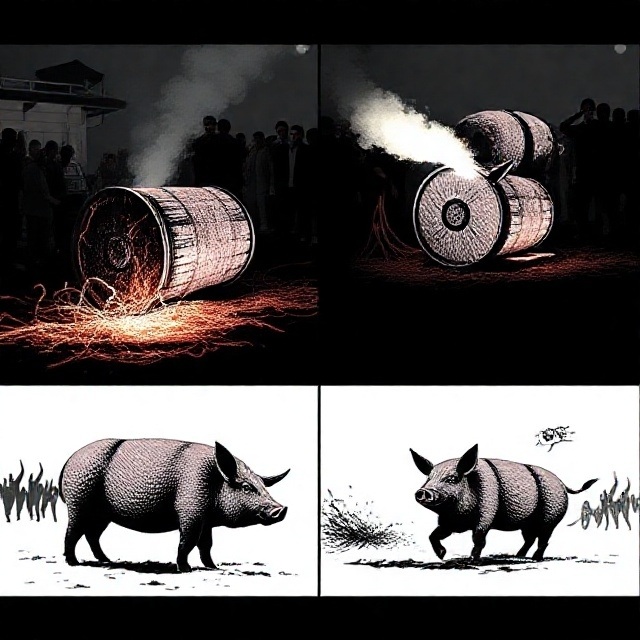When you hear the phrase “pork barrel,” your first thought might be about food, not politics. Yet this idiom has nothing to do with barbecue or kitchen storage. Instead, it’s a colorful expression used to describe how politicians direct government spending for local projects that mainly benefit their voters.
The term has been around for more than a century, but it remains one of the most debated idioms in political discussions today. Whether you’re reading news articles, watching congressional debates, or scrolling through social media commentary, chances are you’ve come across accusations of “pork barrel spending.”
Understanding this idiom is more than just learning political slang. It gives you insight into how governments allocate resources, how politicians secure loyalty, and why some public projects face criticism. Like many idioms, it blends history, metaphor, and cultural perspective into one powerful phrase.
In this article, you’ll discover the pork barrel idiom definition, where it came from, why it matters in politics, and how it’s used in everyday conversation. We’ll also explore real-life examples, compare it with related terms like earmarks, and highlight its pros and cons. By the end, you’ll not only know what pork barrel means but also understand its significance in shaping policy and public opinion.
Let’s dive in.
Pork Barrel Idiom Definition
The pork barrel idiom refers to the allocation of government spending for localized projects that primarily benefit a particular politician’s district or supporters, often with the goal of securing votes or political favor.
In simple terms, pork barrel means funding projects not because they are necessary nationwide, but because they help a specific politician look good locally.
For example:
- A senator pushes for a new bridge in their state even if the project isn’t essential nationally.
- A congressman secures funds for a local sports complex to gain voter approval.
So while the literal phrase points to a barrel full of pork, the figurative meaning points to political favoritism through spending.
Origins of the Term
The roots of “pork barrel” go back to the early 19th century in the United States. Back then, salted pork was stored in barrels as a staple food supply. Plantation owners sometimes handed out pork from barrels to enslaved people as a rare treat. Over time, the image of diving into a pork barrel for scraps became linked to grabbing whatever benefit one could get.
By the 1860s, journalists and political commentators began using “pork barrel” as a metaphor for politicians handing out favors. The first recorded use in a political sense appeared in 1863, when Edward Everett Hale used it in a story published in The Century Magazine.
From there, the idiom became a staple in American politics. By the 20th century, it was widely understood as shorthand for wasteful or self-serving government spending.
Political Context of Pork Barrel
In politics, pork barrel spending describes the use of taxpayer money for projects that benefit a specific area rather than the nation as a whole. Politicians often justify these projects as meeting local needs, but critics argue they are simply a way to buy votes.
Common pork barrel projects include
- Building unnecessary highways or bridges
- Funding museums with limited public interest
- Supporting stadiums or recreational facilities in small towns
- Allocating research grants with little practical value
For instance, the famous “Bridge to Nowhere” in Alaska— a $398 million proposal to connect a small town to an island of only 50 residents— became one of the most notorious pork barrel examples in US history.
Pork barrel politics continues because it’s effective. Local voters often support politicians who bring money and jobs to their district, even if the spending is excessive.
Pork Barrel vs Earmarks
Although the terms are sometimes used interchangeably, pork barrel and earmarks aren’t identical.
- Pork Barrel: Usually refers to wasteful spending done for political gain.
- Earmarks: Legislative provisions directing funds to specific projects. Not all earmarks are pork barrel, but many are criticized as such.
Here’s a quick comparison:
| Aspect | Pork Barrel | Earmarks |
| Definition | Funding projects for local benefit, often wasteful | Directing funds to specific projects via legislation |
| Tone | Negative, implies corruption or favoritism | Neutral, though often criticized |
| Purpose | Gain voter loyalty, political favors | Address local needs, influence negotiations |
| Example | $400M bridge with little use | Funding a local hospital through a budget bill |
This distinction matters because earmarks can sometimes serve genuine needs, while pork barrel projects are almost always framed negatively.
Examples of Pork Barrel in Action

Nothing explains the idiom better than real-world cases.
Historical Examples:
- The Tennessee Valley Authority (1930s), though beneficial in many ways, was attacked as pork barrel because of its heavy regional focus.
- The 1960s “Big Dig” project in Boston, costing over $24 billion, was criticized for its spiraling expenses and limited benefits outside the region.
Modern Examples in Congress:
- In 2021, billions were allocated for local infrastructure projects labeled as pork by critics.
- Military spending often includes bases or equipment no longer needed but funded to protect local jobs.
International Parallels:
- In the Philippines, “pork barrel funds” have long been tied to corruption scandals, most notably the Priority Development Assistance Fund scam in 2013.
- Japan has faced criticism for building underused airports and roads as pork barrel politics to please rural constituencies.
These cases show that pork barrel politics isn’t limited to one country—it’s a global phenomenon.
Connotations and Public Perception
The phrase “pork barrel” almost always carries a negative connotation. It suggests waste, corruption, or favoritism. When the media labels a project as pork barrel spending, it usually means taxpayers are footing the bill for something unnecessary.
From a voter’s perspective, the reaction can be mixed. Locals often welcome the jobs and investment, while outsiders see the project as unfair or indulgent.
Politicians, on the other hand, sometimes embrace pork barrel spending as proof they are “bringing home the bacon” for their constituents.
Everyday Usage Beyond Politics
Though rooted in politics, pork barrel idiom can be used outside government. People may use it to describe favoritism or resource allocation in business, organizations, or daily life.
Examples in sentences:
- “The company’s budget was filled with pork barrel projects designed to please certain departments.”
- “Her promotion seemed less about merit and more about pork barrel decision-making by the manager.”
This broader use helps the idiom live beyond the halls of Congress.
Related Idioms and Expressions
Language often groups idioms with similar meanings. Related expressions include:
- Bring home the bacon – to achieve success or provide benefits for a group.
- Feather one’s nest – to enrich oneself at the expense of others.
- Political favoritism – general term for giving unfair advantages.
Each carries a similar undertone of personal or localized benefit at the cost of broader fairness.
Pros and Cons of Pork Barrel Spending
Like most political issues, pork barrel spending has both advocates and critics.
Pros
- Brings investment to local communities
- Creates jobs and infrastructure
- Can address overlooked regional needs
- Strengthens ties between politicians and voters
Cons:
- Encourages wasteful spending
- Diverts funds from national priorities
- Opens the door to corruption
- Favors political gain over public good
The debate continues because both sides have valid points.
Did You Know? (Fun Facts Section)
- The US Congress once funded a $50 million indoor rainforest in Iowa, which became infamous as a pork barrel project.
- Some pork barrel projects get quirky nicknames like the “Bridge to Nowhere.”
- The Congressional Pig Book, published by Citizens Against Government Waste, lists the most egregious pork barrel projects every year.
- In some states, pork barrel politics is jokingly called “bringing home the hog.”
Conclusion
The pork barrel idiom definition goes far beyond political jargon. It captures a centuries-old practice where politicians direct spending to benefit their supporters, often at the expense of broader needs.
While some see pork barrel spending as wasteful, others view it as a way to ensure local communities receive attention. Either way, the idiom highlights the complex balance between politics, governance, and public opinion.
The next time you hear the phrase “pork barrel,” you’ll know it’s not about meat. It’s about power, money, and the timeless tug-of-war between local favors and national priorities.
FAQs
What does pork barrel literally mean?
It originally referred to barrels of salted pork used as food stores, later becoming a metaphor for political handouts.
Is pork barrel always negative?
Mostly yes, since it implies waste or favoritism. However, some argue it helps neglected regions.
How do politicians use pork barrel spending?
They push for localized projects to secure votes, loyalty, and influence.
What’s the difference between pork barrel and earmarks?
Earmarks are specific legislative provisions. Pork barrel implies wasteful or politically motivated earmarks.
Can the idiom be used outside politics?
Yes, it can describe favoritism or biased resource allocation in business, organizations, or daily life.

